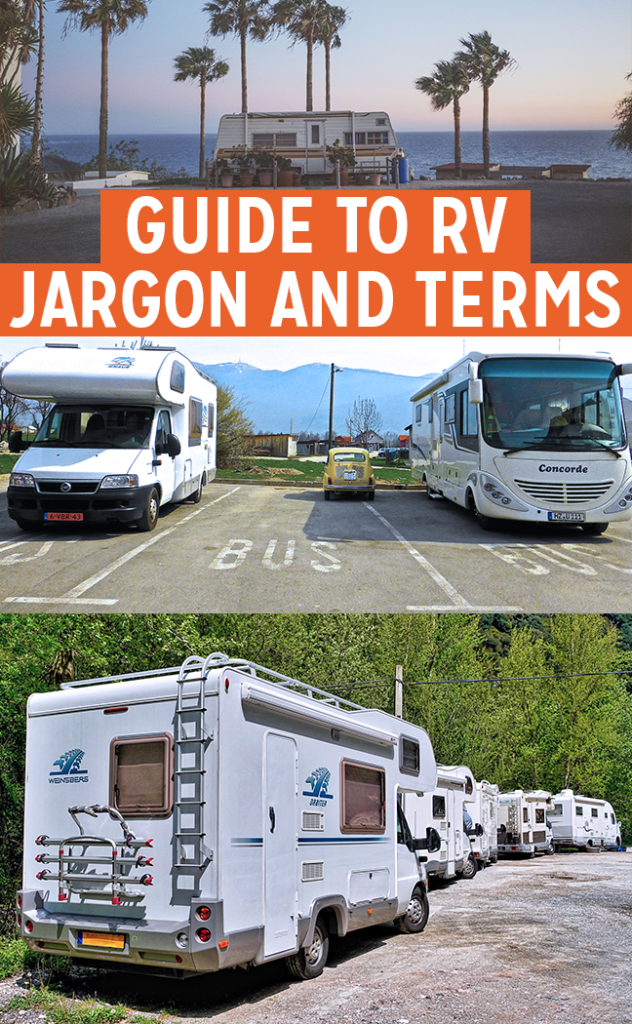
Guide to RV Jargon and Terms
If you spend a lot of time online, chances are that acronyms are a regular part of your vocabulary, YKWIM? Like any culture, the RV world has a language of its own, too. If you’re new to this way of life and plan on hitting the road soon, there are a couple of choice words that will be helpful for you to know. We will cover a the few essentials here, but you can check out online glossaries for a more comprehensive list as well as this guide to RV jargon and terms.
Your RV Thesaurus
RVers love to blog, they also love to talk to other RVers. So knowing more than one word for recreational vehicle will go a long way in keeping your audience from nodding off. You can call it your rig or RV. Some folks refer to it as a motorhome or motorcoach – though you never want to call it a mobile home or Winnebago. The cab or box is the area with your bed (bunkhouse if you have bunk beds), gaucho (kind of an outdated term for a bench sofa that converts into a bed), and dinette, which is also known as a galley. If you’re in a vehicle that resembles a silver bullet, you’re Airstreaming. These are just a few in this guide to RV jargon and terms.
Rig Roadmap
On your travels, you’ll likely hear someone talk about the cockpit. No, RVs can’t fly. That’s where the driver and passenger seats are located. Go ahead and call those seats captain’s chairs, if you want.
The chassis is the steel frame that your RV is mounted on. It encases the steering and suspension systems. For a 16 to 32-foot Type-C, or Class C, mini-motorhome (or mini) your chassis will have a wider cab section. If you have a small sleeping or storage compartment over the cockpit, you’ll want to call that your cabcover, or over-the-cab will do, too.
You’re in a Class-A if your rig is 24 to 40-feet. And, just so you know, you’re traveling high profile if you’re over 6-feet tall and you can stand up straight in your cabin. You can also call yourself an island queen if you have a queen-sized bed with spare space to walk around.
Some RVers like towing a family car along for the ride. That’s your dinghy and it’s connected to the rear of your RV by a hitch.
The Joys of Boondocking
Boondocking means to camp without any modern conveniences, and I don’t mean TV and internet. No running water, no electricity, and no sewage or septic utilities (aka, toilets). Some people call it off the grid, wild camping, or dry camping. You can boondock in a parking lot (called a Wallydock if it’s Walmart) or a national park, but you can’t boondock in your bedroom with the AC running and sounds of thunderstorms playing over your wireless sound system.
If you spend any amount of time on the road, or you’re living in your RV (full-timing), chances are you will find yourself without hookups once in awhile, and when that happens you will need to know a whole different slew of RV terms. We also have this guide to RV jargon and terms to help.
Want to Grow Your Campground Business?
Book a FREE, personalized demo to learn about how RoverPass will save you time and help you earn more revenue
Living Off the Grid
When wild camping, water will be one of your biggest concerns: getting it, purifying it, storing clean and used H20, and releasing it back into the environment. Using a distiller allows you to purify otherwise completely undrinkable water from a lake, stream, or pond – making it potable. The H20 that drains into your holding tank from the shower, bathroom and kitchen sinks is known as gray water. Your sewage – from flushing the toilet – is called black water. These flow into separate holding tanks, stored under the floor.
If you have a large portable plastic tank for your wastewater – a giant, conspicuous bucket placed alongside your rig – that’s called a blueboy. You can only dump gray and black water tanks at designated dumping stations. If you use biodegradable soap and cleaning products, some sites will allow you to sprinkle gray water on the ground. When you do this in the vicinity of your rig, it helps keep dust at bay. But dumping the contents of your tank on the ground is illegal. And really uncool.
Since lots of parks and festival grounds, like Burning Man, are declared “leave no trace” sites, always ask about the gray water policy. But be warned, according to travel and RV bloggers, Gone With the Wynns, “It can be difficult to get a straight answer.” Fortunately, there are tons of gray water hacks online. If dust continues to be a problem, consider using a dirt skirt, or hula skirt, which protects the back of your RV from debris kicked up by the rear wheels.
Sure, most of the words you will need to know when RVing are related to rig maintenance. But you also want to be on the same page when you’re just chatting with other RVers. You never know when someone is going to ask, for example, if your reefer is hooked up. (Reefer is slang for refrigerator.) We hope you enjoyed this guide to RV jargon and terms.
What are your most used RV terms? Leave a comment and share!
